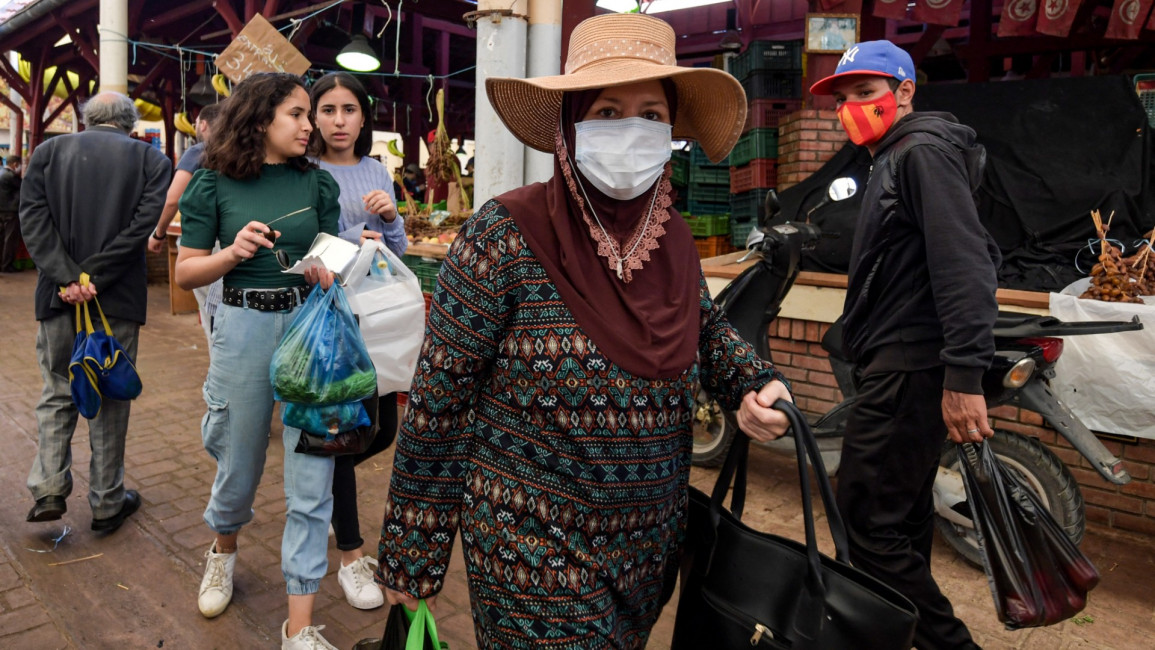Female bloggers 'arrested for joking' in Morocco, Tunisia over social media posts
Female bloggers 'arrested for joking' in Morocco, Tunisia over social media posts
Rights groups are concerned with the way some North African countries are controlling citizens during Covid-19 lockdown.
3 min read
Tunisia eased lockdown measures [Getty]
Two bloggers in the Maghreb have been arrested after using social media to make jokes during coronavirus lockdowns, in what human rights groups are calling a continued violation of free speech in the region.
A young Moroccan woman in Merzouga, a small Saharan locality, was arrested after she made fun of a local authority figure on the social networking app TikTok.
In early April the woman, who remains unnamed in reports, performed a 15-second comedy sketch.
The clip was posted on the social network TikTok, where she imitated the “Caïda Houria,” a local security figure who gained notoriety from her unique way of scolding Moroccans who don’t comply with the mandatory lockdown.
She wore a military uniform which belonged to a friend who is a member of local security forces in the clip.
The video gained traction online, with many Moroccans finding humour in the TikTok, but authorities quickly caught wind of it and arrested the woman.
She was later sentenced to two months in a prison in Errachidia, after being charged with being in violation of article 382 of the penal code prohibiting “unauthorised public wearing of an official uniform.”
This isn’t the first instance of punitive measures taken against free speech in North Africa.
Tunisian blogger Emna Chargui reposted, on Facebook, a short text entitled “Sura Corona,” written and formatted in a light-hearted spirit, in the manner of a Quranic chapter.
On May 4, the judicial police summoned her, and seven members of a public prosecutor’s office interrogated her, according to Human Rights Watch.
|
According to Chargui, one of them said: “There is no freedom of expression when it comes to religion.”
On May 6, Chargui was charged with “inciting hatred between religions through hostile means or violence,” under article 52 of the press freedom decree, and faces up to three years in prison.
Rights groups are concerned that such arrests impede free speech, as countries North Africa remains careful in the face of the Covid-19 pandemic.
Neighbouring Algeria
The Algerian regime is exploiting coronavirus to defeat a protest movement that has shaken it to its core over the last year, analysts say.
Read More: Is Libya on the road to de facto partition?
Despite protesters deciding to halt their weekly gatherings since the start of the public health crisis, repression of regime opponents has persisted.
Security forces have targeted young bloggers, independent journalists, online media and activists from the "Hirak" protest movement.
Rapidly adopted laws ostensibly aimed at preventing the dissemination of false news and hate speech have further stoked fears of an orchestrated campaign to muzzle free expression.
The new laws "aim to repress citizens' freedom of expression," said lawyer and activist Abdelouhab Chiter, a lecturer at the University of Bejaia.
A law on "spreading false information", he said, "was debated and passed by parliament in a single sitting, in the absence of almost half of its members".
Akram Belkaid, a journalist for the Oran daily, warned of "a return to the iron fist as in the 1970s".
"Hirak won the first leg of the game," he said.
"The regime is on course to win the second leg, and its true goal is to prevent any further rematches being held at all - or in other words, to prevent protests reoccurring once the pandemic has been overcome."


![President Pezeshkian has denounced Israel's attacks on Lebanon [Getty]](/sites/default/files/styles/image_684x385/public/2173482924.jpeg?h=a5f2f23a&itok=q3evVtko)



 Follow the Middle East's top stories in English at The New Arab on Google News
Follow the Middle East's top stories in English at The New Arab on Google News


